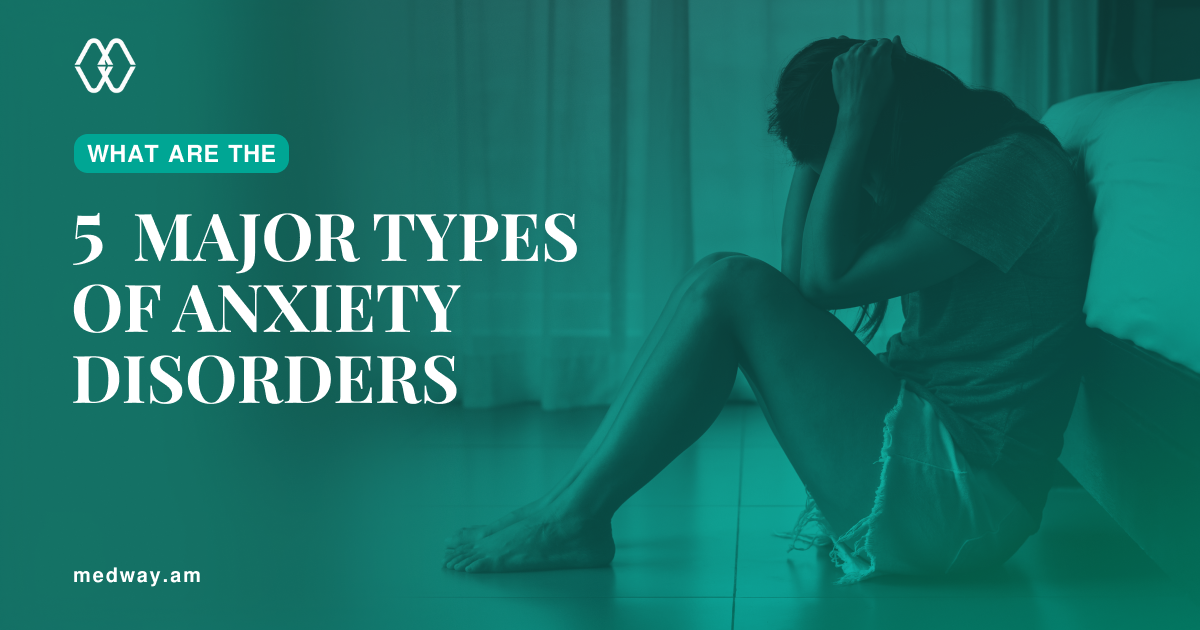
Anxiety is the most prevalent mental health problem in the world. Most of us have experienced anxiety at some point in our lives. It manifests itself in several forms, some minor and some severe.There are five types of anxiety disorders: generalised anxiety disorder, obsessive-compulsive disorder, panic disorder, post-traumatic stress disorder, and social anxiety disorder. Although anxiety can't be fixed overnight, there are some things you can do to make it easier to deal with. This blog will explore the five different types of anxiety disorders and the preventative measures you can take to avoid becoming afflicted.
What is Anxiety disorder?
Anxiety disorder is a mental condition where people experience intense fear, nervousness or apprehension that interfere with their daily life. People suffering from anxiety disorder feel constantly apprehensive about situations, which makes it difficult for them to perform normal physical and mental activities. According to the World Health Organization, about 264 million individuals worldwide have an anxiety disorder.
Types of Anxiety Disorders
Generalised Anxiety Disorder
Generalised Anxiety Disorder, or GAD, is a psychological disorder characterised by excessive, uncontrollable worry about everyday things. This type of anxiety can have serious negative effects on a person’s social, work, and home life. It is an ongoing anxiety that lasts for at least six months. A person with generalised anxiety disorder may experience the following symptoms: Restlessness, fatigue, difficulty in concentrating at work and school, irritability, uncontrollable worrying that interferes with one's quality of life and insomnia.
Obsessive-Compulsive Disorder
Obsessive-Compulsive Disorder which is commonly known as OCD is a mental illness that manifests itself in a variety of ways, including recurring thoughts and urges and repetitive behaviours. Moreover, these recurring thoughts and behaviours result in creating distress and interfere with a person’s daily routine. People with OCD experience obsessions and compulsions that they feel compelled to perform. Some examples of obsessive-compulsive disorder (OCD) behaviours are: 1) checking of objects to reduce the fear of causing harm, 2) cleaning compulsion or washing hands repeatedly to avoid contamination from dirt, germs, and other microbes,3) organising things in a symmetrical way, or in a particular order to help reduce discomfort.
Panic Disorder
Panic disorder, characterised by panic attacks and excessive anxiety, is the most common type of anxiety disorder. A panic attack is an intense episode of fear that is triggered by the body's response to a perceived threat that does not actually exist. People who have panic attacks are often preoccupied with the idea of when the next attack will occur. During a panic attack, several of these symptoms may occur at the same time: pounding heart, sweating, trembling or shaking, difficulty in breathing, chest pain, choking sensation, dizziness and nausea, fear of losing control, detachment and dying. In some cases, it is possible for someone having a panic attack to experience a heart attack due to the severity of their symptoms.
Post-Traumatic Stress Disorder
Post-traumatic stress disorder, or PTSD, is a mental health condition that may develop after a person has experienced a traumatic event such as war, a natural disaster, terrorist attack, car accident, personal assault such as rape or physical attack, or other event where the individual feels intense fear. The symptoms of PTSD vary widely, including: 1) flashbacks of traumatic events, 2) nightmares about unwanted memories 3) avoidance of situations, people, or places that remind them of the traumatic incident. 4) having thoughts about the future that are pessimistic or negative.
Social Anxiety Disorder
Social anxiety disorder is an anxiety disorder characterised by overwhelming fear of embarrassment in everyday social situations. Due to fear of being judged or evaluated negatively, one may avoid the social situation; however, this can lead to isolation and possibly depression. Oftentimes, it will lead one to have a complete lack of exposure to social situations. Some common social anxiety disorders include extreme fear of public speaking, meeting or talking to new people or even eating and drinking in public. People with social anxiety disorder are constantly concerned about what others think of them to the point that they may avoid social interactions.
How to overcome anxiety disorders?
Although anxiety is a complex and ongoing issue, there are some things you can do to make it easier to deal with.
- Keep yourself physically active. Try to exercise 3 times a week, it will boost your mood and help you think less about your fears and phobias.
- Avoid drinking and smoking. Alcohol, nicotine and caffeine are all substances that worsen your anxiety. Try avoiding them as much as you can.
- Get a good amount of sleep. Make sleeping your top priority and try to get seven to eight hours of sleep each night.
- Meditate. Try to engage yourself with meditation activities such as pilates, yoga, or even with visualisation techniques.
- Keep a journal with you. Record in your journal what is causing you stress, as well as any technique that seems to help you feel better.
- Eat healthy. Try to include vegetables, fruits and whole grains in your diet plan. Maintaining a good diet will reduce your anxiety.
- Seek professional help. If none of the above tips are working with you, it is best to seek the advice of a therapist or psychiatrist who can prescribe medication that can help alleviate your anxiety.
To conclude, anxiety is the most prevalent mental health problem in the world. Unfortunately, a lot of people don't seek treatment for their anxiety because they don't understand that it's a mental health problem. They end up thinking it's normal to feel anxious and worry about everything, but it's not. The sooner you realise that you have an anxiety disorder and seek treatment, the more you will be able to enjoy your life.